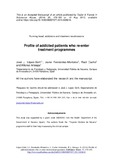Mostrar el registro sencillo del ítem
Profile of addicted patients who re-enter treatment programmes
| dc.creator | López-Goñi, José Javier | es_ES |
| dc.creator | Fernández-Montalvo, Javier | es_ES |
| dc.creator | Cacho Fernández, Raúl | es_ES |
| dc.creator | Arteaga Olleta, Alfonso | es_ES |
| dc.date.accessioned | 2018-04-17T11:49:36Z | |
| dc.date.available | 2018-04-17T11:49:36Z | |
| dc.date.issued | 2014 | |
| dc.identifier.issn | 0889-7077 (Print) | |
| dc.identifier.issn | 1547-0164 (Electronic) | |
| dc.identifier.uri | https://hdl.handle.net/2454/28304 | |
| dc.description.abstract | Objective. This study explored the differential profile of addicted patients who re-enter treatment programmes. Method. A sample of 252 addicted patients (203 male and 49 female) who sought outpatient treatment was assessed. Data regarding socio-demographic factors, drug consumption factors (assessed using the EuropAsi), psychopathological factors (assessed using the Symptom Checklist 90 Revised [SCL-90-R]), and personality variables (assessed using the Millon Clinical Multiaxial Inventory II [MCMI-II]) were collected. Results. 65.9% (n=166) of drug-addicted patients were re-admitted into treatment programmes. All of the variables for which we collected data were compared between these treatment repeaters and patients who were admitted for the first time. Significant differences between the two groups of patients were found for some of the variables that we examined. Treatment repeaters were generally older and had a poorer employment situation than first-time admits. Treatment repeaters were also more likely to report poly-consumption and to have sought treatment for alcohol abuse. Moreover, some of the scores for several EuropAsi, SCL-90-R, and MCMI-II variables were statistically significantly different from those of the first-time admits. Conclusions. According to these results, patients who re-enter treatment programmes often present with more severe addiction problems. The implications of these results for further research and clinical practice are discussed. | en |
| dc.description.sponsorship | This study was supported by a grant (code 359/2012) from the Health Department of the Government of Navarra (Spain). | en |
| dc.format.mimetype | application/pdf | en |
| dc.language.iso | eng | en |
| dc.publisher | Taylor & Francis | en |
| dc.relation.ispartof | Substance Abuse, (2014) 35, 176-183 | en |
| dc.subject | Addiction | en |
| dc.subject | Treatment | en |
| dc.subject | Re-entry | en |
| dc.subject | Dropout | en |
| dc.subject | Assessment | en |
| dc.title | Profile of addicted patients who re-enter treatment programmes | en |
| dc.type | Artículo / Artikulua | es |
| dc.type | info:eu-repo/semantics/article | en |
| dc.contributor.department | Psicología y Pedagogía | es_ES |
| dc.contributor.department | Psikologia eta Pedagogia | eu |
| dc.rights.accessRights | Acceso abierto / Sarbide irekia | es |
| dc.rights.accessRights | info:eu-repo/semantics/openAccess | en |
| dc.identifier.doi | 10.1080/08897077.2013.826614 | |
| dc.relation.publisherversion | https://doi.org/10.1080/08897077.2013.826614 | |
| dc.type.version | Versión aceptada / Onetsi den bertsioa | es |
| dc.type.version | info:eu-repo/semantics/acceptedVersion | en |
| dc.contributor.funder | Gobierno de Navarra / Nafarroako Gobernua, 359/2012 | es |


